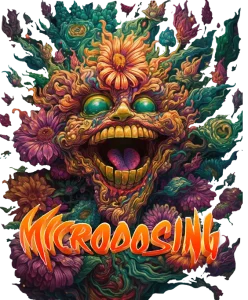The practice of microdosing psychedelics—taking small, sub-perceptual doses of substances like LSD or psilocybin—has gained popularity in recent years, especially among people seeking to enhance their cognitive abilities. Advocates claim that microdosing can boost creativity, improve focus, and even enhance problem-solving skills, all without the hallucinogenic effects typically associated with higher doses of psychedelics. But what does the science say about these claims?
In this article, we’ll explore how microdosing works, what the research shows about its effects on cognition, and whether this practice can truly enhance your brainpower.
What Is Microdosing?
Microdosing involves taking very small doses of a psychedelic substance, typically around 1/10th to 1/20th of a full recreational dose. For example, a typical dose of LSD might be around 100 micrograms, while a microdose is often as low as 10 micrograms. Similarly, for psilocybin, a recreational dose might be 1 to 3 grams of dried mushrooms, while a microdose would be about 0.1 to 0.3 grams.
Unlike a full dose, which can lead to hallucinations and intense shifts in perception, a microdose is designed to be sub-perceptual, meaning that the person taking it doesn’t experience any significant changes in consciousness. Instead, microdosers report subtle effects like improved mood, enhanced focus, and greater mental clarity, all while being able to go about their daily lives.
How Does Microdosing Affect the Brain?
Psychedelics like LSD and psilocybin primarily affect the brain by interacting with serotonin receptors, especially the 5-HT2A receptor, which plays a key role in mood, cognition, and perception. At higher doses, psychedelics can cause significant alterations in consciousness, but at lower doses, these substances may have more subtle effects that influence cognition and behavior.
Here’s how microdosing might affect the brain:
1. Boosting Neuroplasticity
Psychedelics are known to promote neuroplasticity, the brain’s ability to form new connections between neurons. This increased plasticity could help improve learning, memory, and problem-solving skills, making the brain more adaptable to new information and challenges. By enhancing neuroplasticity, microdosing may help people think more creatively and flexibly.
2. Improving Focus and Attention
One of the most commonly reported benefits of microdosing is an improvement in focus and attention. While the exact mechanism isn’t fully understood, it’s possible that psychedelics help modulate serotonin levels in a way that enhances concentration. Some people report being able to focus on tasks for longer periods, making them more productive and efficient.
3. Enhancing Mood and Reducing Anxiety
Microdosing may also have mood-boosting effects, similar to the way higher doses of psychedelics have been shown to reduce anxiety and depression. A positive mood can indirectly enhance cognitive performance by reducing mental blocks and fostering a more open, creative mindset. People who microdose often report feeling less anxious, more optimistic, and more motivated to tackle their work.
4. Encouraging Divergent Thinking
Divergent thinking is a type of thinking that allows people to come up with multiple solutions to a problem, which is a key component of creativity. Psychedelics are known for their ability to promote divergent thinking, and microdosing may enhance this cognitive skill in a more subtle way. By loosening the brain’s usual filters, microdosing might help people think outside the box and explore new ideas.
What Does the Research Say?
While anecdotal reports about the benefits of microdosing are widespread, scientific research on the topic is still relatively new. Here’s what some of the studies have found so far:
1. Improved Mood and Creativity
A study published in the journal Psychedelic Science found that people who microdosed reported improvements in mood, creativity, and general well-being. Participants also said they felt more connected to their work and better able to think creatively. However, it’s important to note that this study relied on self-reported data, which can be influenced by placebo effects.
2. Increased Problem-Solving Abilities
In another study, participants who microdosed before completing problem-solving tasks showed improvements in their ability to find creative solutions. The researchers hypothesized that microdosing helped participants break free from rigid thinking patterns, allowing them to approach problems with a more open mindset.
3. No Significant Cognitive Enhancements in Some Studies
Not all research has shown positive effects, though. A study published in Psychopharmacology found no significant improvements in cognitive performance among people who microdosed compared to those who took a placebo. This suggests that the cognitive benefits of microdosing may not be as consistent or pronounced as some proponents claim.
4. Placebo Effect
Some research indicates that the placebo effect may play a role in the perceived benefits of microdosing. In a large placebo-controlled study, participants who thought they were microdosing but were actually taking a placebo still reported positive effects, such as improved mood and focus. This suggests that some of the benefits of microdosing might come from the expectation of improvement rather than the actual chemical effects of the substance.
Potential Benefits of Microdosing for Cognitive Enhancement
Despite the mixed research, many people continue to microdose, citing a range of benefits for cognition and mental performance. Here are some potential advantages of microdosing for cognitive enhancement:
1. Enhanced Creativity
Many artists, writers, and professionals who work in creative fields report that microdosing helps them come up with new ideas and think more innovatively. By encouraging divergent thinking, microdosing may help people explore different perspectives and generate novel solutions to complex problems.
2. Improved Focus and Productivity
People who microdose often say that they are able to focus better on their tasks and feel more productive throughout the day. This increased focus can help with everything from deep work to completing everyday tasks more efficiently.
3. Boosted Motivation
Microdosing may also help improve motivation, making it easier to start and complete tasks. Some people report feeling more engaged in their work and more driven to achieve their goals when microdosing.
4. Reduced Anxiety and Stress
Microdosing has been linked to reductions in anxiety and stress, which can indirectly improve cognitive performance. By promoting a more relaxed and positive mindset, microdosing may help people approach tasks with greater clarity and less mental resistance.
Risks and Considerations
While microdosing is generally considered safe when done responsibly, there are some potential risks and downsides to consider:
1. Lack of Long-Term Research
One of the main challenges with microdosing is the lack of long-term research. While many people report positive effects in the short term, it’s unclear whether microdosing has any long-term impacts on cognition or mental health. More research is needed to determine whether regular microdosing is safe over extended periods.
2. Individual Variability
The effects of microdosing can vary widely from person to person. Some people experience noticeable cognitive benefits, while others report little to no effect. Factors like the type of psychedelic used, the dose, and the individual’s brain chemistry all play a role in how effective microdosing is.
3. Legal Issues
Psychedelics like LSD and psilocybin are still illegal in many countries, making microdosing risky from a legal perspective. While some places have decriminalized psychedelics or allow their use in therapeutic settings, it’s important to be aware of the legal status of these substances in your area.
4. Potential for Overuse
Although microdosing involves taking very small amounts of psychedelics, there is still the potential for overuse or misuse. Some people may be tempted to take larger doses to achieve more noticeable effects, which can lead to unintended consequences, such as altered perception or impaired functioning.
Conclusion: What the Science Says About Microdosing for Cognitive Enhancement
The idea of using psychedelics to enhance cognition is an intriguing one, and early reports suggest that microdosing may offer benefits like improved creativity, focus, and problem-solving abilities. However, the scientific evidence is still mixed, and much of the data comes from self-reported experiences rather than controlled clinical trials.
While some studies show positive effects, others suggest that the benefits of microdosing may be partly due to the placebo effect. More research is needed to fully understand how microdosing impacts cognition and whether it can reliably enhance mental performance in the long term.
For now, those interested in microdosing should approach the practice with caution, keeping in mind both the potential benefits and the limitations of the available research.

